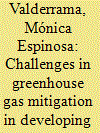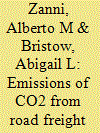|
|
|
Sort Order |
|
|
|
Items / Page
|
|
|
|
|
|
|
| Srl | Item |
| 1 |
ID:
162917


|
|
|
|
|
| Summary/Abstract |
CO2eq emission scenarios for the Colombian transport sector were estimated for 2010–2050. We used a marginal abatement cost approach to assess an emission mitigation pathway. For this purpose, we constructed a carbon emission accounting model linking travel demand to vehicle stock, fuel consumption, and emissions for the Colombian transport sector. Actions related to energy efficiency, fuel switching, new engine technologies and modal change were considered. The analyzed measures have the potential to reduce the cumulative emissions by 8% and 18% under the BAU scenario through 2030 and 2050, respectively. Mitigation costs are high and imply annual capital costs that range from 0.5% to 4% of the national GDP. Gains in efficiency as well as synergy with other sector objectives might help justify some of the actions in financial terms. Non-technological actions, such as high public transit participation in the urban modal share and reorganization of the freight system, play a significant role in attaining low-carbon transport systems in Colombia.
|
|
|
|
|
|
|
|
|
|
|
|
|
|
|
|
| 2 |
ID:
111318


|
|
|
|
|
| Publication |
2012.
|
| Summary/Abstract |
Between 1989 and 2004, energy consumption for road freight in the UK is estimated to have increased by only 6.3%. Over the same period, UK GDP increased by 43.3%, implying that the aggregate energy intensity of UK road freight fell by 25.8%. During this period, therefore, the UK achieved relative but not absolute decoupling of road freight energy consumption from GDP. Other measures of road freight activity, such as tonnes lifted, tonnes moved, loaded distance travelled and total distance travelled also increased much slower than GDP. The main factor contributing to the observed decoupling was the declining value of manufactured goods relative to GDP. Reductions in the average payload weight, the amount of empty running and the fuel use per vehicle kilometre also appear to have made a contribution, while other factors have acted to increase aggregate energy intensity. The results demonstrate that the UK has been more successful than most EU countries in decoupling the environmental impacts of road freight transport from GDP. However, this is largely the unintended outcome of various economic trends rather than the deliberate result of policy.
|
|
|
|
|
|
|
|
|
|
|
|
|
|
|
|
| 3 |
ID:
094855


|
|
|
|
|
| Publication |
2010.
|
| Summary/Abstract |
Freight transport has been receiving increasing attention in both literature and practice following the growing recognition of its importance in urban transport planning. This paper analyses historical and projected road freight CO2 emissions in the city of London and explores the potential mitigation effect of a set of freight transport policies and logistics solutions. Findings indicate a range of policies with potential to reduce emissions in the period up to 2050. However, this reduction would appear to only be capable of partly counterbalancing the projected increase in freight traffic. More profound behavioural measures therefore appear to be necessary for London's CO2 emissions reduction targets to be met.
|
|
|
|
|
|
|
|
|
|
|
|
|
|
|
|
| 4 |
ID:
104964


|
|
|
|
|
| Publication |
2011.
|
| Summary/Abstract |
Because a large proportion of total operating costs for transportation companies goes towards energy, a reduction in energy operating costs, brought about by an increase in fleet fuel efficiency, or an increase in operational efficiency, results in a change in the relative cost of road freight transportation. This fact could result in an increase in the demand for such services. If this is true, the result would be an increase in total fuel consumption. Consequently, that part of the energy savings obtained through the increased energy efficiency would be lost. The existence of a "Rebound Effect" is especially important in the road freight transportation sector and is crucial for the definition of a national energy policy.
In this study, data from the road freight transportation sector in Portugal for the years of 1987 through 2006 was analyzed. It was determined that an increase in energy efficiency did not cause a backfire, but did cause a total direct rebound effect of 24.1%. In addition, fleet operators were more inclined to adopt operational efficiencies than technological fuel efficiencies as a means of increasing the total operational efficiency.
|
|
|
|
|
|
|
|
|
|
|
|
|
|
|
|
|
|
|
|
|